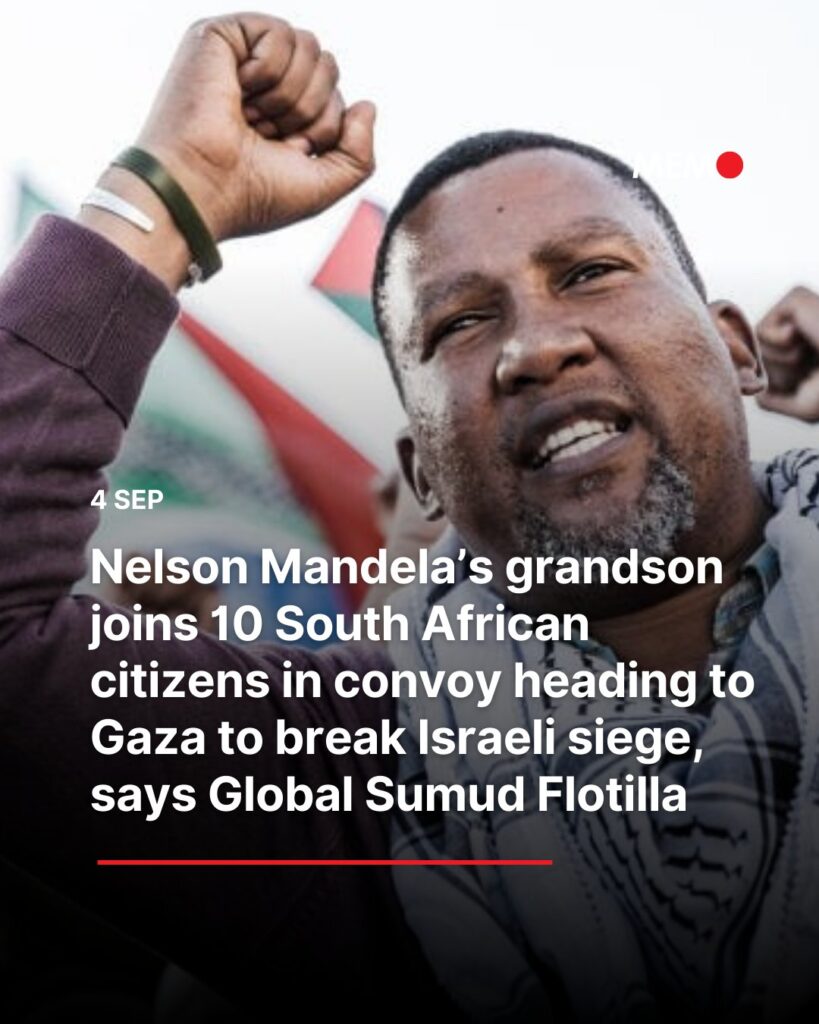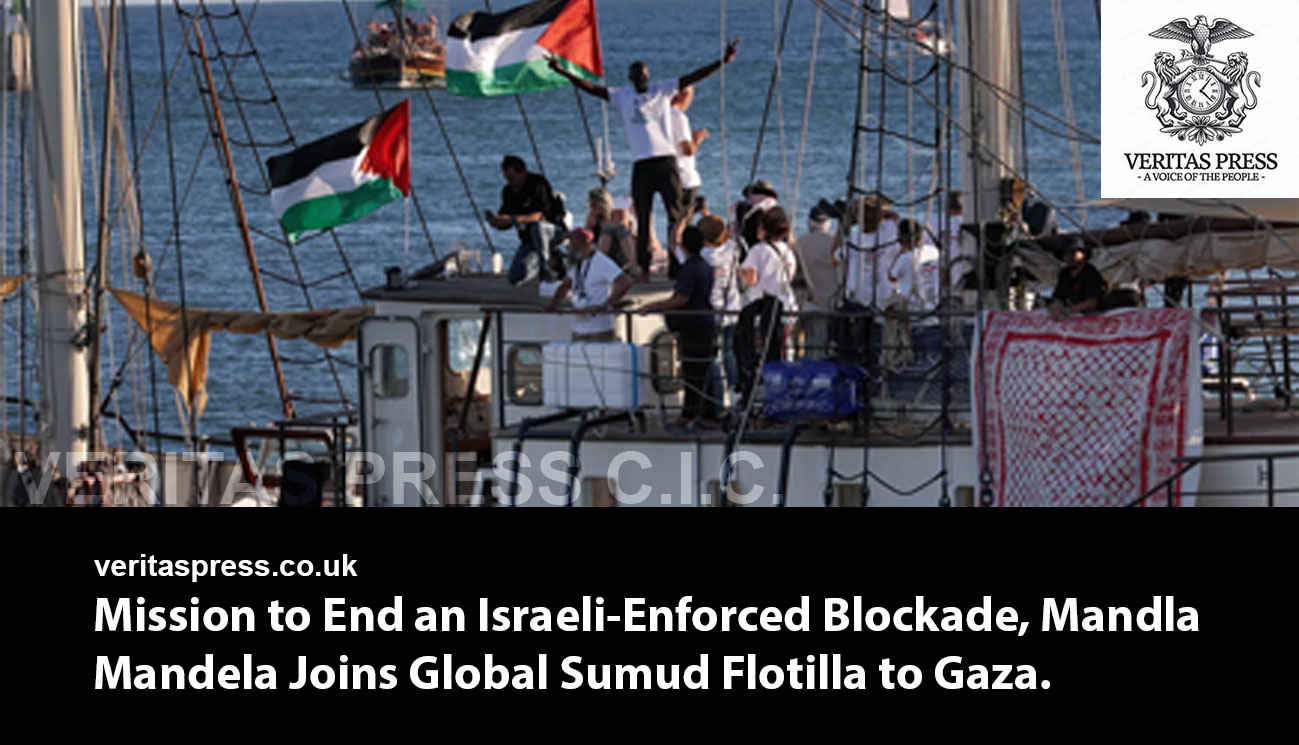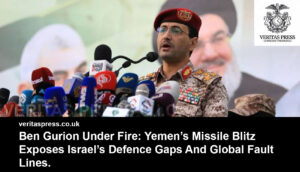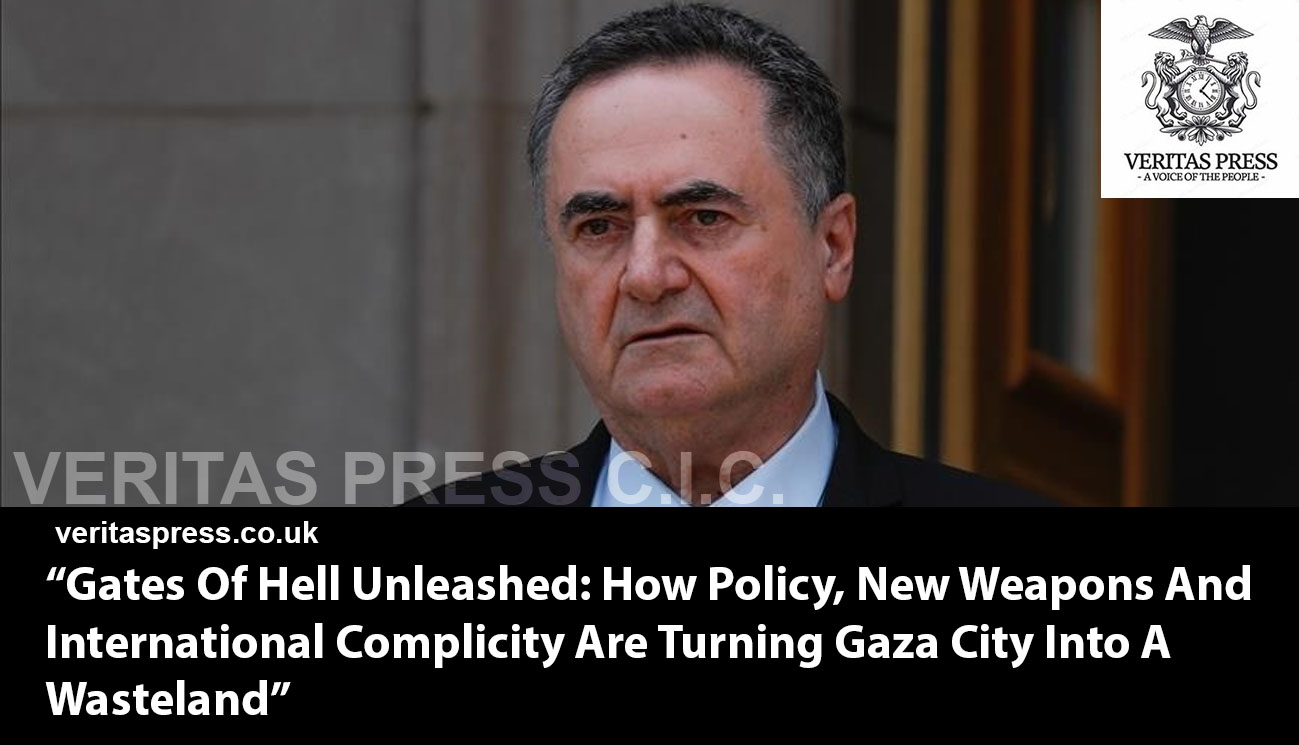Press Release: Veritas Press C.I.C.
Author: Kamran Faqir
Article Date Published: 05 Sept 2025 at 13:47 GMT
Category: Middle East | South Africa | Sumud Flotilla
Source(s): Veritas Press C.I.C. | Multi News Agencies
Johannesburg / Mediterranean: In one of the largest maritime solidarity missions in modern history, the Global Sumud Flotilla is sailing toward Gaza to challenge Israel’s 18-year blockade, a naval siege that rights groups call collective punishment and a violation of international law.
Among its most prominent participants is Nkosi Zwelivelile “Mandla” Mandela, grandson of Nelson Mandela, who framed the mission as part of a global duty to confront Israeli apartheid. Speaking before departure in Johannesburg, Mandela declared:
“Palestinians are experiencing a far worse form of apartheid than we ever did. Israel’s blockade is strangling life itself in Gaza. The world stood by us in South Africa; it must stand by Palestinians now.”
A Humanitarian Armada Under Siege:
The flotilla, consisting of over 50 vessels and 15,000 participants from 44 countries, is the largest civilian convoy ever to set sail against an Israeli military blockade. Carrying food, medical supplies, and water, organizers insist their mission is not just humanitarian but political: to expose the blockade itself as a form of warfare.
Amnesty International describes Israel’s blockade as “collective punishment of Gaza’s civilian population.” The UN Human Rights Council has repeatedly condemned the restrictions, warning they are designed to manufacture humanitarian collapse rather than ensure security.
Irish writer Naoise Dolan, sailing from Barcelona, told The Guardian:
“Our governments decry genocide in Gaza while enabling Israel’s military machine. By sailing, we’re forcing them to choose between complicity and resistance.”

Storms, Drones, And Israeli Threats:
The flotilla has already faced storms that forced emergency stops in Menorca and Mallorca, where vessels underwent repairs and safety checks. Journalists aboard confirmed drone surveillance in international waters, widely suspected to be Israeli.
Meanwhile, Israel’s far-right National Security Minister Itamar Ben-Gvir branded all participants “terrorists” and urged their arrest and the confiscation of vessels.
Flotilla organisers countered in a joint statement:
“If delivering baby formula, food, and medicine makes us ‘terrorists,’ then the word has lost all meaning. The real terror is Israel’s blockade itself.”
South African Voices On Board:
While Mandela’s presence has drawn headlines, dozens of South Africans from diverse professions have also joined the mission, framing it as a continuation of their country’s anti-apartheid legacy.
- Dr. Zaheera Soomar, a medical doctor and public health specialist, told IOL before boarding in Tunisia:
“As a doctor, I cannot remain silent while Israel weaponised hunger and disease. Gaza is being forced into famine by deliberate blockade. Our duty is not only to heal but to resist.”
- Jared Sacks, a Cape Town-based activist and author, emphasised the link between grassroots resistance in South Africa and Palestine:
“When Israel calls this flotilla terrorism, it’s the same language Pretoria used against us in the 1980s. Then, as now, repression proves the oppressor’s fear of solidarity.”
- Zukiswa Wanner, novelist and cultural activist, stressed the role of artists:
“Words and stories dismantled apartheid as much as sanctions did. By being here, I’m helping Palestinians tell their story against Israel’s attempts to silence them.”
- Professor Noor Nieftagodien, a Wits University academic specializing in liberation history, highlighted the historical continuity:
“The blockade of Gaza is apartheid’s cousin. This flotilla is part of the same arc of struggle that toppled South African apartheid, boycotts, defiance, global mobilisation.”
Their participation illustrates that South Africa’s solidarity is not rhetorical, but lived: an export of the country’s liberation memory into today’s frontlines.
Dockworkers And Global Resistance:
The flotilla has sparked wider mobilisations. Dockworkers in Genoa pledged to halt shipments to Israel if flotilla ships are attacked. A spokesperson told Truthout:
“If contact with the flotilla is lost, even for 20 minutes, we will shut the port. That is our red line against Israeli genocide.”
This echoes the boycotts of South African goods during apartheid, now reactivated against Israel, signalling that civil society is preparing to escalate pressure beyond symbolic protest.
Echoes Of The Mavi Marmara Massacre:
Veteran journalists recall the 2010 Mavi Marmara raid, when Israeli commandos killed nine activists attempting to break the siege. The Global Sumud Flotilla, they warn, could face a similar fate.
South African participant Zaheera Soomar was blunt:
“If Israel kills us, let the world call it what it is, murder to enforce starvation. Not security. Not defence. Just murder.”
The Global Stage: Law And Legacy.
South Africa is already leading legal action against Israel. In its genocide case at the ICJ, Pretoria listed the blockade as part of Israel’s systematic attempt to destroy Gaza’s people. The International Criminal Court is also considering charges against Israeli officials for starvation as a war crime.
For Mandla Mandela, the flotilla is a test of global will:
“Sanctions, boycotts, and flotillas helped topple apartheid in 1994. If the world acts with the same courage today, Israeli apartheid too will fall.”
Beyond The Horizon:
Whether or not the flotilla reaches Gaza, its moral and political impact is already undeniable. It has reframed the blockade not as an Israeli “security” measure but as a deliberate weapon of domination.
As Haaretz journalist Amira Hass noted:
“The blockade is not about preventing weapons. It is about preventing normal life. That is its weapon.”
From South African doctors and writers to European dockworkers and climate activists like Greta Thunberg, the flotilla has become more than an aid mission. It is a civilian tribunal at sea, putting Israel’s blockade and the governments enabling it, on trial before the conscience of the world.
Conclusion: A Civilian Tribunal on the High Seas.
The Global Sumud Flotilla is more than a convoy of boats, it is a civilian tribunal on the high seas, indicting Israel’s blockade not as a matter of “security,” but as a deliberate tool of domination and extermination. The Israeli-enforced siege has weaponised food, medicine, and fuel, creating famine conditions in Gaza that UN experts say are manufactured, not natural.
The fact that doctors, trade unionists, parliamentarians, dockworkers, climate activists, and descendants of liberation icons now risk their lives at sea illustrates how Gaza has become a moral fault line for the entire world order. Just as the apartheid regime in Pretoria could not survive international boycotts and sanctions, Israel’s system of apartheid and blockade is being exposed as unsustainable, its legitimacy eroding with every interception of aid, every drone strike on a civilian vessel, every starving child.
Critically, the flotilla unmasks not only Israel’s crimes, but also the complicity of Western governments that continue to arm, finance, and politically shield Tel Aviv while issuing hollow statements about human rights. As South African participants remind us, apartheid fell when governments were forced to act by a global movement of civil resistance.
Whether these boats reach Gaza’s shores or are once again seized in international waters, the political cargo they carry is already delivered: a public reckoning with genocide in real time. To stop them, Israel must once more reveal its fear of transparency, its reliance on violence, and its contempt for international law. To let them through would mean conceding the illegitimacy of the siege itself.
The Sumud Flotilla has already broken the blockade, not of Gaza, but of global silence. What remains is whether the international community will meet this moment with the same courage as the passengers who, against storms, drones, and threats of death, continue to sail under one message to the people of Gaza: “We see you, we hear you, and we are coming.”




























Leave a Reply